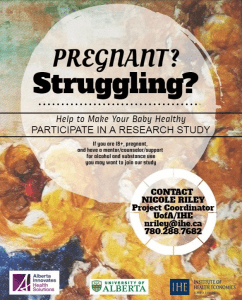Helping pregnant women tackle addictions
The Institute of Health Economics and the University of Alberta are running a study from the summer of 2016 to 2018 that aims to find new ways of preventing Fetal Alcohol Spectrum Disorder (FASD).
In Alberta, 46,000 people currently live with FASD and approximately 700 to 1,900 babies are born with the disorder each year.
Jasmine Brown, a research coordinator with the study, said it is likely these numbers are even higher because FASD is difficult to diagnose early. “FASD is a spectrum disorder, so there are many alcohol disorders that fall within the spectrum. A lot of diagnoses can’t happen until the child is school age.”

Brown said the goal of the study is to see how a breathalyzer can help women with alcohol dependency stay sober during pregnancy. The hope is by self-monitoring blood alcohol concentration, pregnant women will be motivated to reduce drinking.
Study participants use the device three times a day: in the morning, before bed, and a trigger time chosen by each woman.
Drinking alcohol affects a developing fetus from day one. Unfortunately, women may not know they are pregnant for a number of weeks.
“Statistically, it’s about 50 per cent of women that don’t know they’re pregnant until about four to six weeks in,” Brown explained. “The first weeks are pivotal because the neural tube [precursor to nervous system] is developing.”
Brown said the “culture of drinking is popular in Canada”, compounding the problem.
Women with addiction issues often need help and support to stay sober during pregnancy. “Often these addictions stem from their environments,” Brown added, and explained the women may have little control over these violent or high-stress environments.
The Young Women’s Christian Association (YWCA) offers Pregnancy Pathways, a program connecting women with dependency issues to services and supportive housing. David Berger, program founder, said he finds a real difference can happen when mother and child stay together, especially in families where separation is often the case.
“Another reason the breathalyzer technology becomes useful is to document their sobriety to prove to loved ones that they’ve changed,” Brown said.
Women struggling with addictions can face doubts about sobriety from loved ones. The researchers hope to address this by documenting the participants’ sobriety throughout the study.
“We’ve heard from some of the women that it gives them a sense of pride,” Brown said. “Seeing the zero is like a gold star. The hope is that it will help to create a lifestyle change to keep them from drinking after their pregnancy as well.”
The study is Alberta-wide and open to women 18 years and older, up to six months pregnant, and already using Alberta Health addiction support services. Enrollment began this summer.
More information
Nicole Riley, Institute of Health Economics
nriley@ihe.ca or 780.288.7682
Jasmine Brown, Institute of Health Economics
jbrown@ihe.ca







